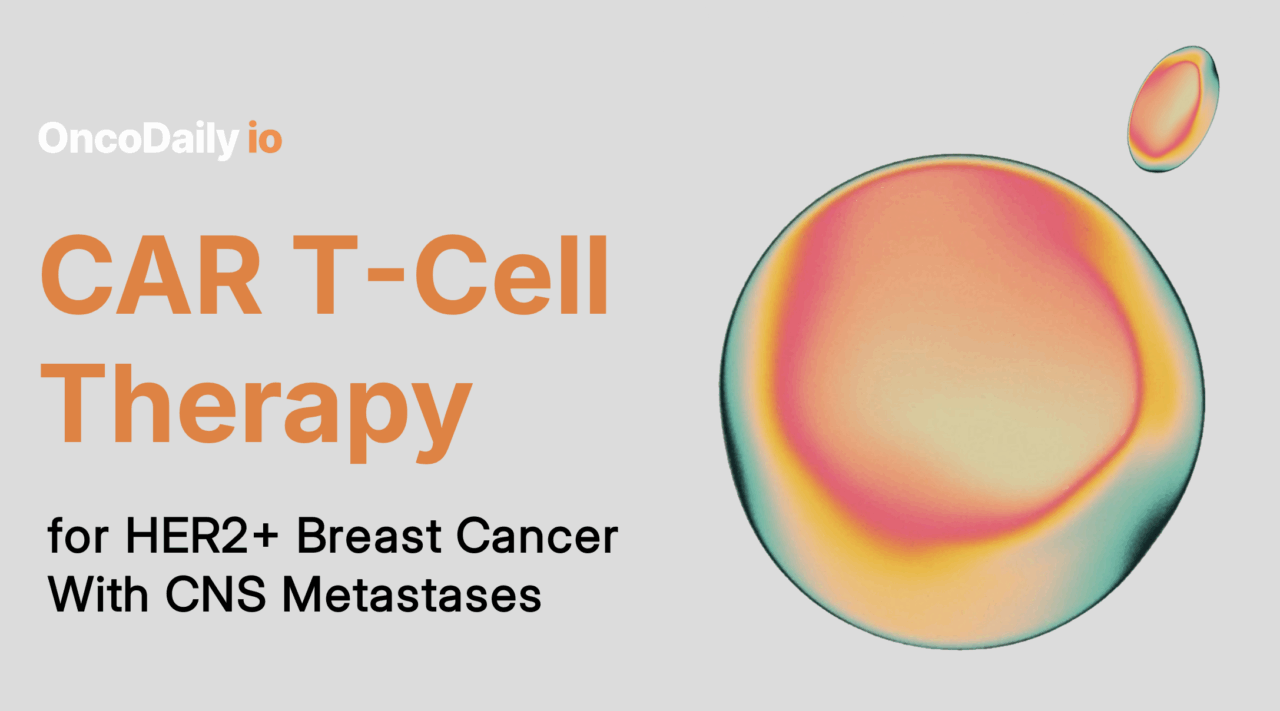A phase 1 clinical trial presented at the 2025 Society of Neuro-Oncology Annual Meeting reported encouraging early safety findings for intraventricular HER2-directed CAR T-cell therapy in patients with HER2-positive breast cancer who developed recurrent brain metastases or leptomeningeal metastases (LM)—two of the most devastating complications in advanced HER2-driven disease.
Led by Jana Portnow, MD, from City of Hope, this first-in-human study demonstrated that intraventricular administration of HER2-targeted CAR T cells, with or without lymphodepletion, was feasible, safe, and capable of inducing disease stabilization in a heavily pretreated population with few therapeutic options.
Background: A Critical Unmet Need in HER2+ CNS Progression
HER2-positive breast cancer is known for its propensity to metastasize to the central nervous system (CNS). Patients with recurrent brain or leptomeningeal disease after radiation or intrathecal chemotherapy typically have poor prognosis and limited access to effective therapies. Traditional CAR T-cell therapy has been largely restricted to hematologic cancers. Delivering CAR T cells directly into the CSF through the ventricular system offers a way to bypass the blood–brain barrier and target tumor cells within the CNS.
This phase 1 trial represents one of the first efforts to test HER2-directed CAR T-cell therapy specifically for breast cancer CNS metastases.
Study Design
This single-center, phase 1 trial (NCT03696030) enrolled adults with:
- HER2-positive breast cancer (IHC 3+ or FISH amplified)
- Recurrent brain metastases after radiation or
- Recurrent leptomeningeal metastases after intrathecal therapy
- Karnofsky Performance Status ≥70
- No limit on prior lines of therapy (patients received a median of 4–6 prior chemotherapies)
Patients were required to pause systemic chemotherapy or endocrine therapy during the first 3 CAR T cycles, and dexamethasone >6 mg/day was prohibited to avoid suppression of CAR T activity.
Treatment Approach
In this phase 1 study, patients were assigned to one of two treatment strategies. The first cohort received HER2-directed CAR T-cell therapy alone, while the second cohort received lymphodepletion followed by CAR T-cell therapy. Lymphodepletion consisted of a short course of cyclophosphamide (300 mg/m²/day) and fludarabine (25 mg/m²/day)administered for three consecutive days, a regimen intended to enhance CAR T-cell expansion by reducing immune competition.
Following lymphodepletion (or directly, in the non-LD cohort), CAR T cells were administered intraventricularlythrough an Ommaya reservoir. The treatment used an escalating dose design to evaluate safety across increasing levels of cellular therapy. Patients received CAR T infusions starting at Dose Level 1 (2 × 10⁶ cells in the first cycle, then 10 × 10⁶ cells in subsequent cycles), progressing to Dose Level 2 (10 × 10⁶ → 50 × 10⁶ → 50 × 10⁶), and Dose Level 3, the highest explored level (20 × 10⁶ → 100 × 10⁶ → 100 × 10⁶).
The primary objective of the study was to determine the safety and tolerability of delivering HER2-directed CAR T cells directly into the CSF. Secondary assessments evaluated how long CAR T cells persisted in both cerebrospinal fluid and peripheral blood, along with associated cytokine fluctuations that reflect immune activation. Investigators also monitored central nervous system clinical benefit, including the durability of stable disease, as well as median CNS progression-free and overall survival.
Safety Findings
Overall, intraventricular HER2-directed CAR T-cell therapy demonstrated a manageable safety profile across both treatment cohorts. The most frequently observed adverse events were low-grade (grade 1/2) symptoms, including headaches, nausea, vomiting, fever, fatigue, and myalgias. These effects typically appeared within the first 24 to 48 hours after each infusion and resolved quickly with supportive care.
Neurotoxicity: Two patients who received lymphodepletion experienced mild immune effector cell–associated neurotoxicity syndrome (ICANS), presenting as transient confusion and lethargy. No higher-grade neurotoxicity was observed.
Dose-Limiting Toxicities: In the cohort that received lymphodepletion followed by CAR T-cell therapy, investigators reported two dose-limiting toxicities—both grade 3 headaches. These events prevented patients from receiving all planned CAR T-cell doses and highlighted a clearer toxicity signal when lymphodepletion was added.
Impact of Lymphodepletion: The addition of lymphodepletion increased the overall rate and severity of toxicities but did not improve the durability of stable disease. However, lymphodepletion did appear to enhance biologic activity of the CAR T cells, as reflected by greater evidence of on-target immune activation and increased CAR T-cell persistence in the cerebrospinal fluid.
Efficacy: Disease Stabilization Achieved
Although responses were modest, stable disease (SD) was achieved in both treatment groups.
Cohort 1: CAR T Alone (n = 10)
- SD rate: 44%
- Median duration of SD: 56 days (range 50–136 days)
Cohort 2: LD + CAR T (n = 13)
- SD rate: 64%
- Median duration of SD: 56 days (range 44–134 days)
No partial or complete responses were observed, which is expected in a phase 1 CNS CAR T safety trial. Importantly, patients with SD often exhibited clinical stabilization despite being heavily pretreated.
Correlative Analyses: Evidence of Biological Activity
Correlative studies offered important insights into how the intraventricular HER2-directed CAR T cells behaved in the central nervous system and how the immune system responded to therapy.
CAR T-Cell Persistence in the CSF
Analyses showed that CAR T-cell persistence in the cerebrospinal fluid increased with escalating dose levels. Persistence was even more pronounced in patients who also received lymphodepletion, suggesting that reducing baseline immune cells may create a more favorable environment for CAR T expansion and survival.
In several patients, repeated CAR T-cell dosing led to the gradual disappearance of malignant cells on CSF cytology—an encouraging sign of biological activity.
Cytokine Dynamics
HER2-directed CAR T-cell infusion triggered a measurable rise in pro-inflammatory cytokines in the CSF, such as IL-2 and IFN-γ, reflecting active CAR T-cell engagement with tumor targets. Over time, these cytokines declined, while anti-inflammatory cytokines became more prominent, indicating a shift in the immune landscape as the CNS adapted to treatment.
